Mountain, road, gravel, track — in my 25(ish) years of cycling, I’ve tried it all. There is one cycling discipline that remained unknown to me: virtual cycling. That’s right, I’m talking about the Zwift craze.
You see, I grew up in the cold, snowy, and wet state of Vermont. From November to April, I spent hours on an indoor trainer and rollers, ticking away the miles. I was scarred by those years of sweaty, boring indoor cycling. So, I was reluctant to jump into the world of Zwift, though I knew it would be more entertaining than the old radio player that kept me company while I spun on my rusty set of Kreitler rollers, 20-odd years ago.
I didn’t want to write off Zwift without giving it a shot, though.
For this challenge, which I facetiously named “Zero to Zwift Hero,” I took a month to try and learn how to ride Zwift. I’m raced every week in the USA Cycling Virtual Race Series (sponsored by STPC) and tracked my progress to share my insight with you. Did I become a Zwift Hero or will I get dropped like a rock? Read on for my weekly account of this Zwift exploration.
- My indoor cycling setup
- Week 1: A Zwift rider is born
- Week 2: Now the hard work begins
- Week 3: I think I’m addicted
- Week 4: The end, but also the beginning
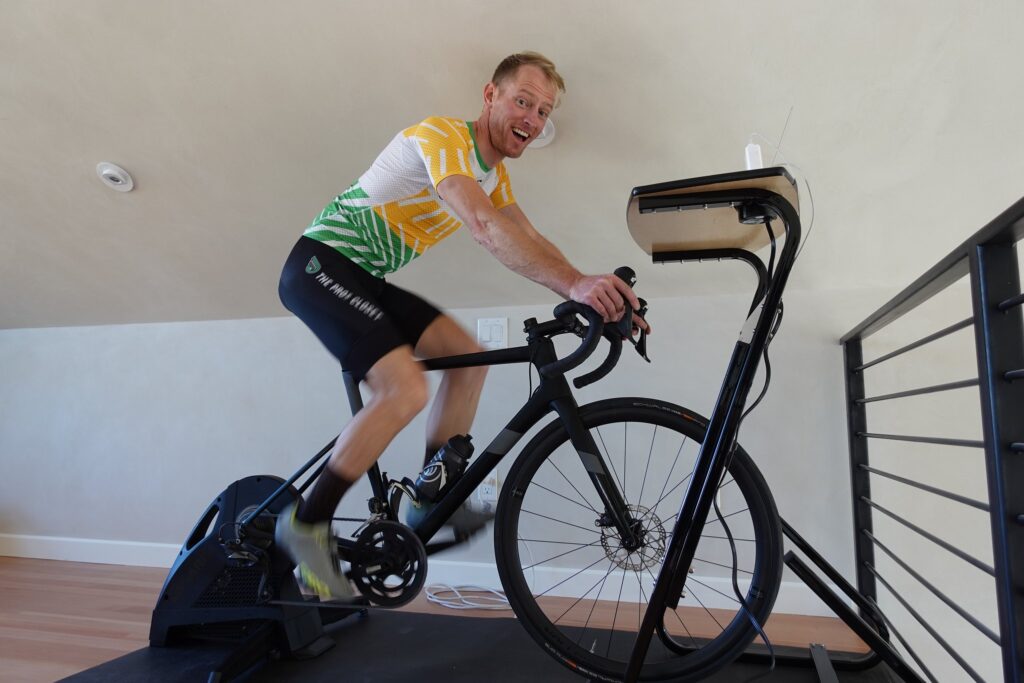
My indoor cycling setup
As you might know, TPC sponsors the Saris + The Pro’s Closet (STPC) Zwift team, so I have ample resources at my disposal to learn the world of virtual cycling. Saris was kind enough to send me an H3 trainer and a TD1 trainer desk. I also used a Saris trainer mat to keep the sweat off the floor and a couple of fans that were likely too small to make a difference.
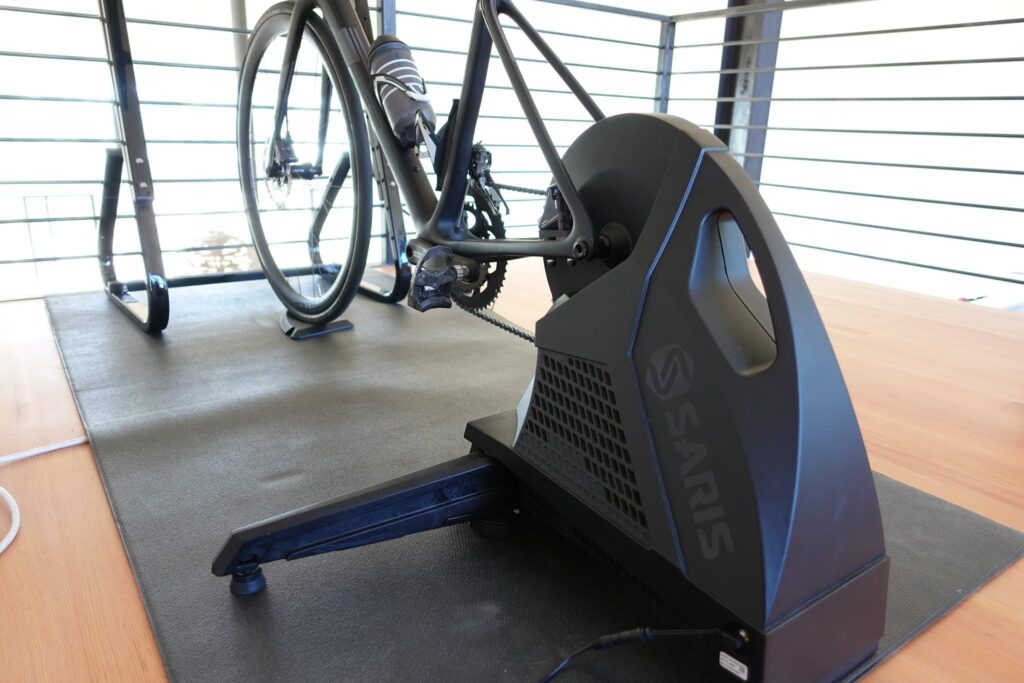
The Saris H3 direct-drive smart trainer is one of the best setups on the market. 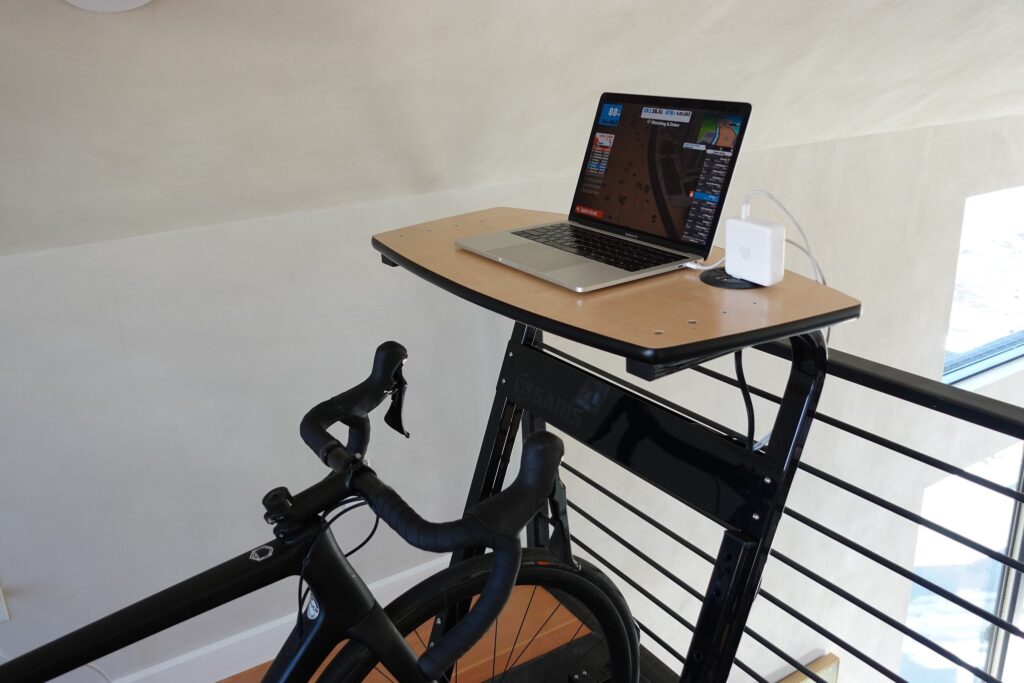
Saris’s TD-1 trainer desk positions my computer right above the front wheel for easy access.
Christmas came early — I got a few big boxes full of new toys, and the snow started to fall. The timing couldn’t have been much better for my Zwift challenge to begin.
It wasn’t necessarily difficult to set up my new Saris H3 direct-mount smart trainer, but took a little time to get all the details right. After the basic unboxing, I mounted a cassette to the trainer and installed the appropriate end caps to fit my bike’s dropouts. The trainer desk bolts together easily enough. Having just moved into my new house, I’ve had lots of practice assembling furniture lately.
Beyond physically assembling my Zwift gear, I needed to set up the guts of this high-tech equipment. I recovered my password from the dormant Zwift account I opened five years ago. I signed up for Zwift Power, which organizes virtual racing and rankings. I downloaded the Saris app, which lets me calibrate the trainer. Surely it was wrong… there’s no way my power is this low! But yes, it was right. I also downloaded the Zwift app for my computer and smartphone. Everything pairs nicely with either Bluetooth or Ant+.
Then, I dove in head-first — riding, racing, group rides, I packed it in this first week! Partly, that was due to some terribly windy and cold weather that made riding outside a nonstarter. Also, I was just curious to try something new, and boy was it new. It has been a really long time since I felt like a beginner in the realm of bikes, and I learned a few things the hard way:
Take it step by step
I wanted to dive right into Zwift racing, but STPC rider Matt Gardiner slowed my roll and recommended I first learn the dynamics of riding in a pack and “drafting.” The easy way to get started is to join a ride with a Zwift pacer bot. These bots are set to ride a consistent pace based on watts per kilo (w/kg). I hopped on with one of these robot riders and quickly started to feel how I should modulate my power to stay positioned in the group.
Third time’s the charm
Having raced bikes for decades, I couldn’t hold back my competitive urge. On day two of Zwifting, I thought “why not try this KISS race.” At least it would help me shake out the bugs before Wednesday’s USAC event. So I lined up, was ready to go, and then everyone else in the race vanished. I was alone. Turns out I had downloaded the wrong Zwift app! There are two — Zwift and Zwift Companion. The former is a mobile option for riding in the game. The latter is a way to augment your computer’s app with chat, maps, and more. I had the normal Zwift app running, and it kicked me off the race and took over. So, be careful which app you run. The blue Companion app is what I have up alongside my computer when I’m Zwifting.
My second racing fail came a day later in the USAC event. If you follow the TPC Instagram, you might have watched as I lined up and then suffered a virtual “flat tire” right before the start. Imagine being at the start of a ride or race with a flat tire and then having no idea how to remove your wheel, what a tube was, or even how to attach a pump and air it up. That was me when I had a power drop-out. The trainer was fine. I could tell I was putting out wattage. But Zwift said 0 watts. I believe I did two things wrong: My Ant+ stick was too close to a fan, which can cause electrical interference, and it was too far from my trainer — they say three feet or less is best. I disconnected my trainer, then reconnected it, which solved the issue, but I had a long, hard, and lonely ride to finish that race. From now on, I’ll stick to Bluetooth, which has been good so far.
Finally, on Friday I got it right. I hopped in the Team IRL Without Borders race, rolled out with the group, no problem. And then I promptly got dropped on the climb. It turned out to be an exceptionally mountainous route. Nowhere to hide for a Zwift newbie like myself. It was brutally hard, but fun. I even successfully deployed an Aero Helmet power-up in the finish to win the sprint for 64th.
A Zwift-piphany
So, the racing didn’t go super smoothly this week. Even when I sorted my technical mistakes, I was getting dropped like a rock. But I did have one major epiphany the day after my disastrous USAC race — call it a Zwift-piphany.
I realized that group rides are one of the best things you can do on Zwift.
My first was SlowTwitch’s Hilly Vanilli ride. As you’d expect, there’s some climbing, up Zwift’s volcano, but it wasn’t as miserable as what I’d face the next day in that IRL event. Every group ride has a leader, who is pretty strict about keeping the pace within a giving w/kg range. You know what you’re getting into, because every group ride has that pace listed up-front. Wouldn’t that be nice to know when you roll up for an unfamiliar group ride on the open road?
Zwift group rides helped me continue to develop my pack skills, which can be downright entertaining. They’re also very social with people chatting from start to finish.
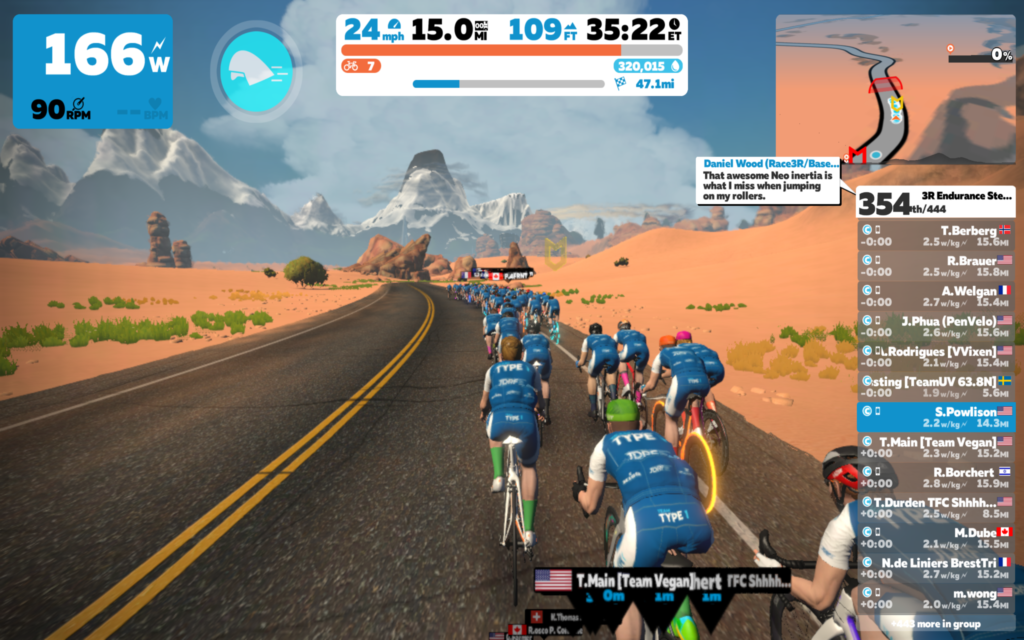
I couldn’t resist signing up for another on Saturday as the howling Colorado wind kept me inside, and to my shock, I got through a 63-mile 3R Endurance ride and actually enjoyed it! I cannot remember the last time I logged an indoor ride over two hours, but this one flew by as I worked on maintaining position and using the draft.
Looking forward to week 2, more snow is in the forecast, and I’m hoping I can find a race that suits my strengths a little better than the brutal seven-mile climb that crushed me in the IRL race. Stay tuned, and let me know if you have any questions or suggestions in the comments!
Week 1 stats:
- Level 8 (out of 50)
- Ranking: 159,053rd
- 15-second power: 8.33 w/kg
- 1-minute power: 5.29 w/kg
- 5-minute power: 4.08 w/kg
In a lot of ways, Zwift isn’t quite like “in real life” (IRL) riding. Unless you have an elaborate setup, there’s no steering or balance required. You’re constantly drenched in sweat unless you have an industrial fan (I don’t). And accidentally unplugging your trainer can totally ruin a planned group ride. (Yep, that happened to me this week).
But when I get dropped in a race, well, that feels pretty familiar to me, and it’s just as demoralizing.
After overcoming my first-week learning curve on Zwift, I was starting to feel pretty good about myself. My setup was dialed. I was starting to understand how to “draft” other riders in the bunch. My second attempt at the USA Cycling Virtual Race series went pretty well. I hung with the small but strong B group until the final climb. After that result, I got a little cocky and decided to take on the IRL Without Borders weekly race again. That’s when I got humbled.
With 80+ riders on the start, it was a stacked field. I thought I had a chance with the relatively flat London course. I was wrong. Even though I produced my best power output numbers so far, I watched the group ride away from me as we sped past the “Thames.”
Clearly, I still have a lot to learn. So, I called up U.S. national Zwift champion Holden Comeau, who rides for our Saris + The Pro’s Closet team. Comeau suggested a couple of drills to use in group rides that could help me work on my pack riding skills. I can only put out so much power, but if I practice Zwift and find ways to ride efficiently, at least I can make the most of what I’ve got.
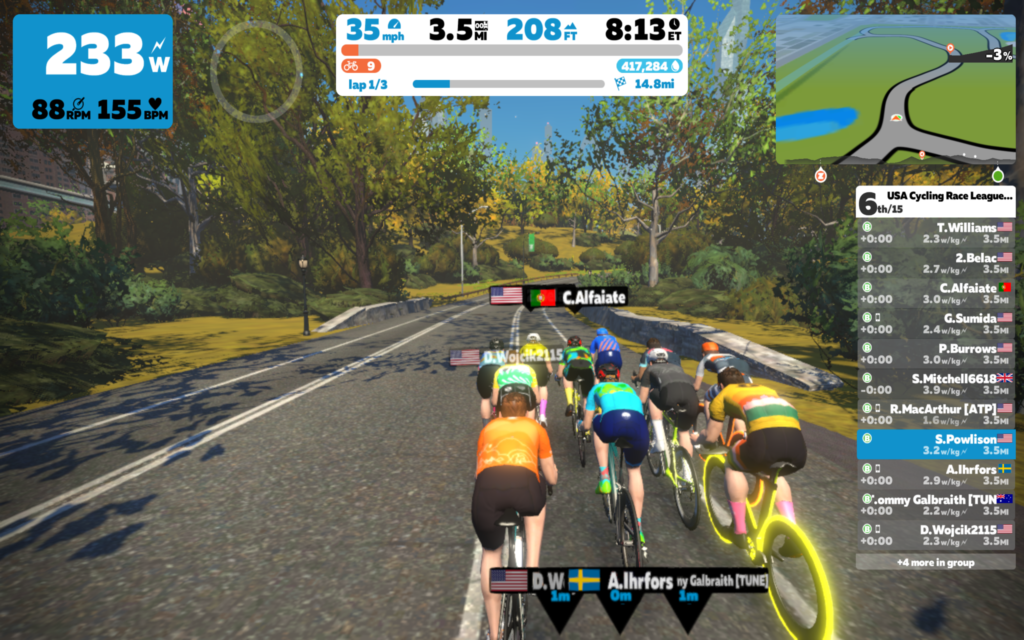
Zwift drill #1: The washing machine
Experienced road riders know the washing machine effect. In a group of cyclists, people swell to the front of the group while others are swallowed up and drift back. The pace ebbs and flows, making it challenging to hold position. Ideally, you stay near the front of the group, but out of the wind. The same idea applies to Zwift.
Comeau suggested finding a position toward the front of the group, perhaps 5-10 riders back from the front. The objective is to modulate your power output to remain in that position, no matter who moves up and who drifts back.
This drill requires a lot of focus and some pretty precise pedaling. I found myself overdoing it at first and ending up on the front of the group, rather than a few wheels back. It’s also easy to lose focus for a moment and drift back 10 riders before you know it. I certainly found this made trainer time fly by!
Start by playing this game for short periods of time, like five minutes. That way fatigue doesn’t creep in and lead to sloppy riding. Give yourself little breaks to avoid mental (and physical) fatigue.
Zwift drill #2: The shadow
This second drill is more difficult, so try to master the washing machine first. Comeau suggested choosing a rider in the group and then shadowing them as they move throughout the peloton.
One practical consideration: Most Zwift group rides have all of the riders wearing the same kit, so sometimes it’s tricky to find someone with a distinctive helmet or bike to spot in the bunch. I have been finding that the “Tron” bikes really stand out.
As you follow your rider through the bunch, you’ll find they surge and fade rather unpredictably. Watch their avatar carefully and respond quickly with either more or less power. If they are drifting back faster than expected, it can help to coast briefly to cut speed. Your accelerations have to be carefully modulated as well.
Zwift drill #3: Leapfrog
Here’s a bonus drill that I came up with on my own while riding with a pace partner group on Sunday. The object of the drill is to move up in the group with precision.
Set yourself up toward the front of a group, perhaps 10 riders back. Look at the riders in front and pick one that will be your target. Then, using a precise acceleration, move past the riders in between so you end up on your target rider’s wheel.
I find this is easier to do in a slower group, so maybe start with a group ride that’s a category below where you usually ride or race. The Pace Partner groups also work well because they’re steady rides that are less prone to unexpected surges. Remember, this is a positioning drill, not a sprint workout. It’s easier to practice power control when you aren’t on the rivet!
Week 2 stats:
- Level 9 (out of 50)
- Ranking: 44,924th
- 15-second power: 8.87 w/kg
- 1-minute power: 5.49 w/kg
- 5-minute power: 4.35 w/kg
I think I am addicted to Zwift. I can’t believe it, but in my third week of Zero to Zwift Hero, I logged six rides on the virtual cycling platform. Four of them were races. The funny thing is, I’m really not that good at racing on Zwift.
My biggest achievement so far has been making it to the final lap of Friday’s crit in the main bunch. I just keep getting dropped in these races, whether they’re mountainous, hilly, or flat, and regardless of whether there are 100 starters or 10 starters. So, as silly as this sounds, finishing with the bunch (okay at the back of the bunch) was cause for celebration.
Rather than discourage me, this continuous drubbing has made me stubbornly determined to figure this thing out. I think I’ll need more than the one-month timeframe I set out for myself in this project to get faster and more experienced, but so far, the challenge keeps me motivated.
In the meantime, I can impart a little bit of wisdom from my experience that might help you get more out of riding Zwift. For this week, let’s talk about the Zwift Companion app.

What is the Zwift Companion app?
This might sound confusing at first but bear with me — there are two Zwift apps for your smartphone. The one that’s an orange icon, “Zwift: Ride and Run,” works the same as the Zwift app that you download onto your laptop or desktop. It’s good to have, but that’s not what we’re talking about here.
The Zwift Companion app is shown as a light blue icon and it works in support of the Zwift app as you run it on your computer. The Companion app lets you do a variety of things, both before, during, and after your virtual ride.
Three ways I like to use the Zwift Companion app:
1. Find races and rides
I think part of my Zwift obsession is directly related to the Events tab on the Companion app. I find myself compulsively browsing the upcoming rides and races, which is easy to do in the app. At a glance, you can see what category a ride or race will be, lettered A-E based on the watts/kilogram average pacing. You can see how many riders are signed up and what the duration or distance will be. Tap on a race or event and you’ll see more details about the route, including a map. There will also be an event description followed by the oh-so-tempting “+” buttons that let you easily register to participate. Using this feature, I have found a bunch of great events, like Zwift founder Eric Min’s Thanksgiving morning group ride, which attracted more than 3,000 riders.
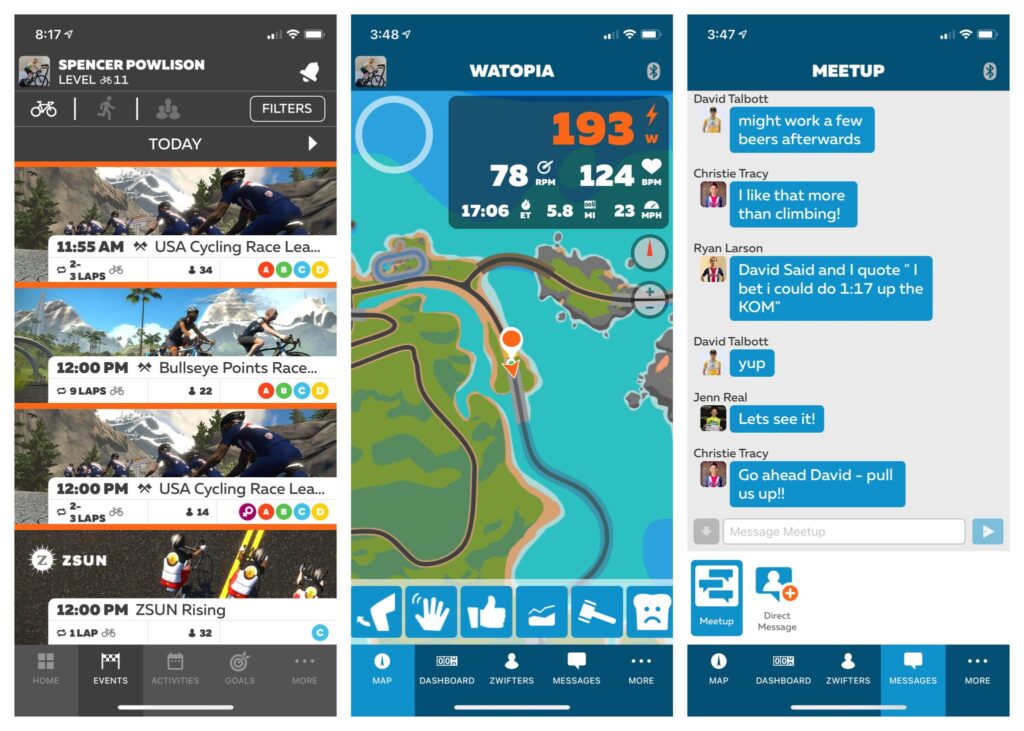
2. Use the game controller to say “ride on!”
Once you start riding, menu options on the Companion app will change. I usually have my app set on the Map tab, which as you’d expect, shows a more detailed map of the world where you’re riding, along with basic riding stats like wattage, heart rate, time distance, and more. But perhaps more importantly, this view offers buttons at the bottom that let you control your avatar. You can flip a U-turn if you don’t want to climb the Epic KOM to the top. Or, you can give nearby Zwifters a “ride on” or a wave. The only trick to these buttons is that you need to hold them down for a few seconds to get them to actually work. I realized that after I tried tapping them a few times to no avail.
3. Get social with chat
Zwift is an incredibly social platform, which has surprised me more than perhaps any other aspect of the game. On a big group ride, the chat tab of my Companion app is constantly blowing up. Those chat messages also display on your computer’s game screen, but if you don’t read them right away, they’ll disappear. The entire chat history is shown on the Companion app. You can also easily reply to the conversation there. Well, maybe “easily” is an understatement. Typing and riding is certainly a skill that I have yet to master!
There are likely many other features on the Zwift Companion app that I have yet to discover. For instance, you can set goals or adjust your workouts on the fly. But for now, it’s enhanced my Zwift experience by encouraging me to participate in more events and connecting me with the thousands of other riders out there in the world of virtual cycling.
Week 3 stats:
- Level 11 (out of 50)
- Ranking: 32,633rd
- 15-second power: 8.87 w/kg
- 1-minute power: 5.49 w/kg
- 5-minute power: 4.46 w/kg
I have a confession. I did not embark upon this one-month Zwift challenge in good faith. In the beginning, I tried to be open-minded. Of course, in these blog entries, I was positive and upbeat about Zwift. But in my heart of hearts, I really didn’t like the idea of virtual cycling one bit. Take a month, give it a fair shake, and then be done with Zwift — that was my plan.
To my surprise, I discovered that I enjoy virtual cycling far more than I ever imagined.
Thirty days is definitely not enough time to notably change my physiology, to boost my power output or fitness, but it was enough to change my perspective.
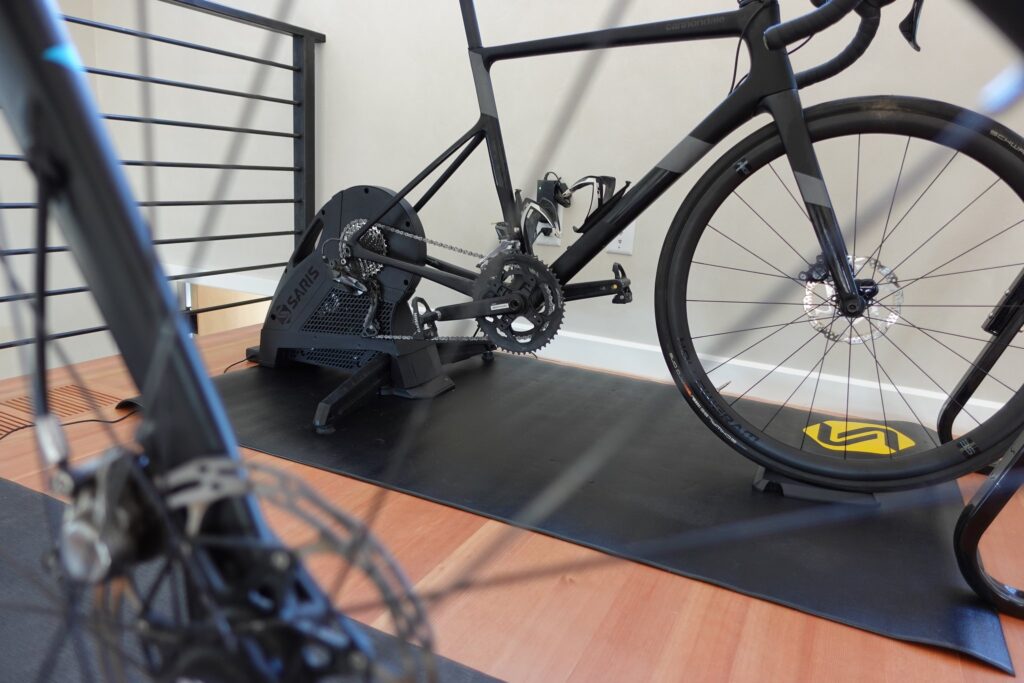
Zwift will never completely simulate the feeling of balance, speed, and motion. It will never take you to a new place (at least a physical place). And you sure can’t Zwift ride to the grocery store or the office. But Zwift is wonderful because it is welcoming, social, interactive, challenging, and downright convenient, especially if you live somewhere with real winter weather or have a busy schedule.
If you have riding experience, you can bring the fundamental toolkit to this new realm. But there will be a lot to learn and many miles to go before you can truly master it.
Some of the lessons I learned in this last month of Zwift sound all too familiar in hindsight. I should have known better than to try and race myself into shape rather than setting out a specific training plan. You need to pick a course that suits your strengths and know it well to succeed if you’re racing. And, like any form of cycling, it’s always more fun when done with friends, new, old, and virtual.
To me, cycling is all about the challenge. Chasing my limits inspired me to race all kinds of bikes, to ride more than 200 miles on gravel roads in a day, and to tackle the rockiest mountain trails in my area. Zwift is just the latest way for me to continue exploring my limits. A way to feel like a novice again.
So for all of you Zwift novices out there, here are some tips, thoughts, and suggestions:
Want to try racing?
Don’t do what I did. I jumped in too fast, which can be discouraging. (Fortunately, I’m stubborn.) Start by riding with a Zwift Pace Partner that matches your anticipated watts per kilogram (w/kg) pacing. These bots ride a steady power, which will let you get the hang of riding in a pack. Next, find a group ride that is the right w/kg pace and work on your skills there. The pacing will be more variable, which is the next progression of pack riding skills on Zwift. Finally, when you’re ready, find a race that will suit your skills — are you a climber? Do you prefer flat routes? Maybe something with short hills will be best? Then, before you race, ride that course to learn its ups and downs. Failing that, find the course on Zwift Insider and familiarize yourself with its key features.
This way, when you’re ready to race, you’ll have practiced the skills, picked the best course for you, and studied up on what to expect.
Want to just ride Zwift?
I never really enjoyed riding Zwift alone without any purpose. It might be different for you, so give it a try, but if you find yourself a little bored (like I did), find a group ride to join. The Zwift Companion app is one of the easiest ways to browse the ride schedule, as I mentioned in an earlier entry. If you don’t feel like riding with strangers, you can also organize a meet-up with friends. In either case, riding Zwift becomes a lot more fun when you do it with others and can chat (and heckle) along the way. There are also structured workouts available in Zwift for those who’d rather focus on improving their fitness. This is something I’ll explore in the future because I’ve definitely been discovering my weaknesses over the course of a month of racing. I really need to improve my sprints and short, maximal efforts.
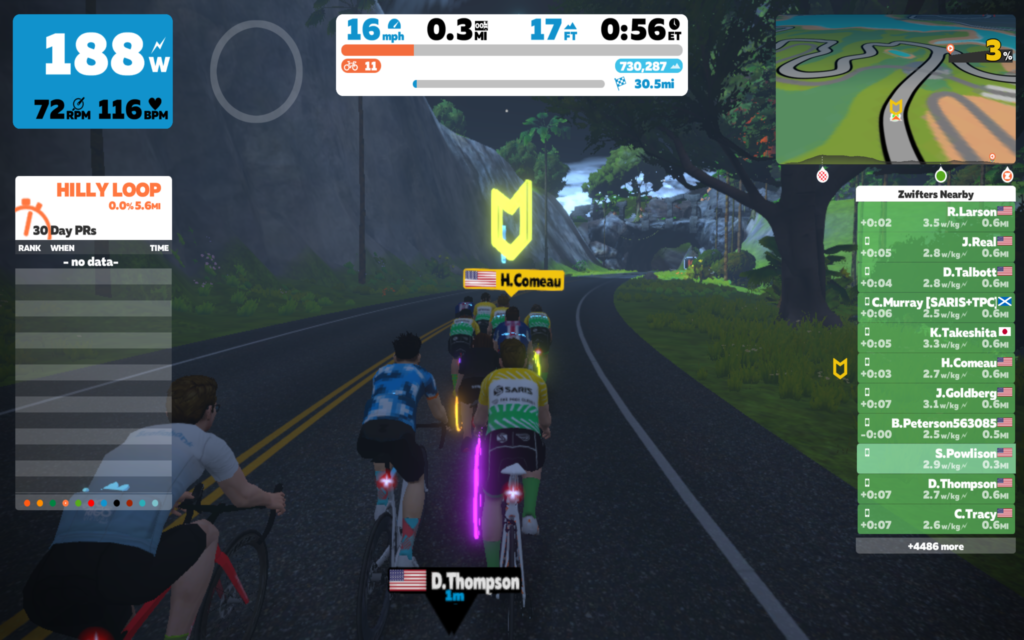
If I were king of Watopia
Finally, I’ve given Zwift a lot of thought over the last month or so, and I have a few ideas of how I’d change the game if I was in charge of things.
First of all, I’d offer a way to compensate for high-altitude riding. I know this isn’t a typical issue, but personally, I think I’m at a disadvantage because my trainer set-up in my home is about 7,000 feet above sea level. I’ve got a lot less oxygen at my disposal!
Second, although it’s impressive how realistic Zwift can be, I think the game should have the option to spice things up a little bit. Wouldn’t it be fun if we could chase monsters or freeride on the Redbull Rampage course? Imagine a Mario Cart and Zwift mashup! The hours (and miles) would fly by if you were dodging Koopa Shells and banana peels.
Finally, along those same lines, I think racing should be a little more forgiving — at least some of the races or race series. Nearly every time I’d race, I’d end up dropped about halfway through. Then, it was a long, lonely trudge to the finish line. While I wouldn’t want to take away from the achievements of the riders who are actually fighting for the win, it sure would be cool if dropped riders like me could get a second (or third!) chance to hop back in the group and at least follow along to the end, even if we didn’t get a result. For example, sometimes when you race an IRL criterium, you can tag onto the back of the group when you get lapped, just to ride with them a bit longer. Imagine just hitting a button on Zwift to transport you back to the peloton so you aren’t so lonely.
Week 4 stats:
- Level 11 (out of 50)
- Ranking: 26,455th
- 15-second power: 8.87 w/kg
- 1-minute power: 5.49 w/kg
- 5-minute power: 4.55 w/kg
One-month tally:
- 27 rides
- 457.9 miles
- 20.66 hours
- 20,755 feet
Editor’s note: this post originally ran on theproscloset.com and is reprinted here by permission

